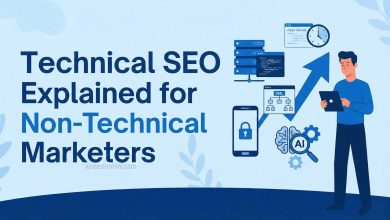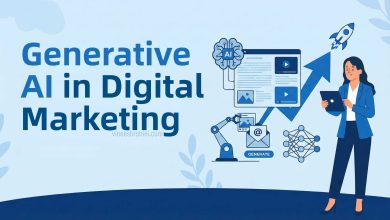Digital marketing Strategies in 2025: Unlock Success with These Powerful Tactics
Digital marketing Strategies in 2025: Digital marketing continues to evolve at an unprecedented pace, driven by advancements in technology, changes in consumer behavior, and the emergence of new platforms and tools. As businesses enter 2025, they must adopt innovative strategies to stay competitive and ensure their digital marketing efforts resonate with a tech-savvy, hyper-connected audience. Below, we explore additional strategies for digital marketing in 2025, along with actionable insights to implement them effectively.

Table of Contents
Key Trends Shaping Digital Marketing in 2025
Before diving into the strategies, it’s essential to understand the underlying trends that are expected to dominate the digital marketing landscape in 2025:
- AI and Automation: Enhanced AI tools for content creation, personalization, and customer service.
- Voice Search Optimization: The growing adoption of voice-activated devices like Alexa and Google Assistant.
- Metaverse Marketing: The use of virtual spaces for immersive brand experiences.
- Sustainability-Focused Marketing: An emphasis on promoting eco-friendly practices and products.
- Hyper-Personalization: Tailoring content and offers to individual preferences using advanced data analytics.
Read more: What is Digital Marketing Strategy ? : Comprehensive Guide 2024
Additional Strategies for Digital Marketing in 2025

1. AI-Driven Personalization
Artificial intelligence (AI) is revolutionizing personalization in marketing. By analyzing customer data, AI enables brands to deliver hyper-targeted ads, product recommendations, and personalized content.
- Implementation:
- Use AI tools to analyze user behavior and segment audiences based on interests and demographics.
- Employ chatbots with natural language processing (NLP) for real-time customer interactions.
- Create dynamic landing pages that adjust content based on visitor preferences.
2. Metaverse Integration
The metaverse offers limitless possibilities for engaging with audiences in virtual environments. Businesses can create immersive experiences, such as virtual showrooms, live events, and gamified marketing campaigns.
- Implementation:
- Invest in VR/AR technologies to build virtual spaces for product exploration.
- Partner with metaverse platforms like Decentraland or Roblox to host branded events.
- Use NFTs (Non-Fungible Tokens) to offer unique digital assets to loyal customers.
3. Voice Search Optimization (VSO)
With the rise of voice-activated devices, optimizing content for voice search is essential. Voice search queries are often conversational and longer than text-based queries.
- Implementation:
- Focus on long-tail keywords and natural language in content.
- Optimize for local search by including “near me” and location-based phrases.
- Use structured data to enhance visibility in voice search results.
4. Interactive Content Marketing
Interactive content fosters greater user engagement and builds stronger connections with the audience. Examples include quizzes, polls, calculators, and interactive videos.
- Implementation:
- Design interactive infographics that allow users to explore data visually.
- Develop AR-based experiences where customers can “try” products virtually.
- Use gamification techniques to make the customer journey more enjoyable.
5. Sustainability Marketing
As consumers become more environmentally conscious, brands must adopt sustainable practices and reflect these in their marketing efforts.
- Implementation:
- Highlight eco-friendly initiatives in campaigns (e.g., carbon-neutral shipping).
- Use recyclable packaging and showcase it in promotional materials.
- Partner with green organizations and support causes that align with sustainability.
Buy now: Premium Digital Marketing E-Books
6. Social Commerce Dominance
Social media platforms continue to integrate e-commerce features, making it easier for users to shop directly. Social commerce bridges the gap between discovery and purchase.
- Implementation:
- Leverage Instagram Shops, TikTok Shopping, and Facebook Marketplace.
- Use influencers to promote products and drive traffic to social commerce platforms.
- Optimize product pages for mobile users since most social media traffic comes from smartphones.
7. Predictive Analytics and Big Data
Predictive analytics uses historical data and machine learning to forecast future trends and behaviors, enabling more effective decision-making.
- Implementation:
- Use predictive tools to analyze purchasing patterns and improve ad targeting.
- Identify customer churn rates and develop retention strategies.
- Personalize email campaigns based on predicted user behavior.
8. Zero-Party Data Collection
With increasing privacy concerns and the decline of third-party cookies, brands need to focus on collecting zero-party data, which customers willingly provide.
- Implementation:
- Use interactive content like quizzes and surveys to gather customer preferences.
- Offer loyalty programs that encourage users to share their data in exchange for rewards.
- Be transparent about data usage to build trust with customers.
9. Collaborative Influencer Marketing
Influencer marketing continues to thrive, but in 2025, collaboration with micro and nano influencers will be more effective due to their highly engaged niche audiences.
- Implementation:
- Partner with local influencers to target specific geographic areas.
- Co-create content with influencers to provide authentic storytelling.
- Use affiliate marketing models to measure the ROI of influencer campaigns.

10. Shoppable Video Content
Video marketing remains one of the most powerful tools, and integrating shopping capabilities directly into videos will drive conversions.
- Implementation:
- Use platforms like YouTube and Instagram Reels to create shoppable video ads.
- Add clickable product links in live-streamed content.
- Highlight user-generated content to build authenticity and trust.
11. Augmented Reality (AR) Marketing
AR enhances customer experiences by allowing them to visualize products in real-world settings.
- Implementation:
- Develop AR apps for customers to “try before they buy” (e.g., virtual fitting rooms for clothing or furniture placement tools).
- Use AR filters on social media platforms to promote new products.
12. Content Localization
Localized content helps brands connect with regional audiences by using culturally relevant messaging.
- Implementation:
- Translate and adapt marketing campaigns for different regions.
- Collaborate with local creators to ensure cultural sensitivity.
- Focus on local SEO to improve visibility in specific geographic areas.
Buy now: Premium Digital Marketing E-Books

Conclusion
As digital marketing progresses into 2025, businesses must remain agile and open to innovation. The strategies highlighted above emphasize the importance of leveraging advanced technologies, prioritizing personalization, and focusing on sustainability to create meaningful connections with audiences.
Adopting these strategies will not only enhance customer engagement but also drive measurable results, helping businesses thrive in an increasingly competitive digital landscape. Whether it’s harnessing the power of AI, exploring the metaverse, or prioritizing sustainability, the future of digital marketing lies in adaptability, creativity, and customer-centricity.



